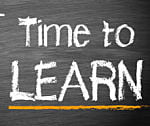 A recent burnout prevention training for residents revealed the importance of the teachable moment for their future employers.
A recent burnout prevention training for residents revealed the importance of the teachable moment for their future employers.
Here's how I learned this important lesson:
There are some things doctors can't really learn until the time is right -- and residency may not be that right time -- no matter how much we wish it was.
I just delivered a half day retreat for a group of residents a large east coast independent academic medical center. In planning the event, I sifted through my experience coaching hundreds of doctors who burned out after residency ... when they were in practice. I was looking for a short list of skills to answer this question:
"Given what burns out practicing physicians, what can I teach these residents now that could prevent their burnout in the future?"
Back to the future
Basically I envisioned myself as a representative of these residents future selves, coming back to teach them the tools they need to avoid physician burnout when they are out in practice.
- So I put together a three training, four hour event
- Delivered the trainings
- And watched carefully to see how they landed with the residents
- What were they able to pick up and use right away?
- What concepts/tools went over their head?
- What appeared to useful and what appeared to be useless at this point in their careers?
My experience gives us all some information to answer the Teachable Moment Question:
Is residency the best place to teach the tools to prevent burnout from happening when these doctors are out in practice?
Or is there a better teachable moment?
============
Our Full Slate of Burnout & Leadership Trainings ...
Is at This Link
============
Here was the training lineup and the skills I chose to teach:
1) The Burnout Proof Workshop
... completing their medical education so they can recognize and prevent burnout in themselves and others. Includes the Boundary Ritual and Schedule Hack - two tools they found fun and useful.
And two more trainings on what I know are missing skill sets in our medical education and very important in preventing burnout.
2) Physician Leadership Power Tools
Stop working so hard (workaholic, perfectionist, Lone Ranger programming) by learning to lead your teams to work together more effectively. All care is team based care. Doctors don't naturally have a skill set to effectively manage teams. This skill is vital once you are out in practice.
3) How to Manage Your Boss
Since most of these residents will end up as employees, knowing how to navigate a bureaucracy and manage their relationship with their boss will be very important. It is another missing skill set and something they would not learn without our training session. And in our coaching practice, we have found a significant conflict with your boss is the #1 reasons doctors change jobs.
==========
This is Blog Post #317
Complete Blog Library is Here
==========

I delivered the event and the residents participated at 100%.
- They learned a lot in the Burnout Proof Workshop. Everything was immediately relevant to their current residency experience.
They learned the tools for leadership and boss management too. At least it was clear they understood the concepts.
But when I asked them
- "what team do you want to practice your leadership skills on?"
- or "what leader do you want to target for a relationship building campaign?"
All I got was blank stares.
Here's the tragedy
- You and I know for a fact, they will have a desperate need for team leadership and boss management skills from day one of their first job.
- And yet, as residents, they felt they had no need and no forum to practice those same skills while in residency.
The Teachable Moment
The teachable moment is where need, meets skill in a forum that drives your desire to practice.
- You have a need
- I teach you a skill to address that need
- You practice in order to address your current pain
- I mentor/coach you as you turn this into a new habit
- You get results that were previously impossible
- Your Problem/Dilemma is addressed effectively
- Your skills are up leveled
- A Permanent Upgrade in your personal effectiveness
In our training sessions, the residents were capable of intellectually absorbing the concepts, but they didn't have a suitable training ground to practice their new skills.
Unfortunately the absence of the teachable moment in residency means they will not have these habits down pat when they need them most in the years ahead. They are destined for some painful on the job training.
=============
Get Your Corporate Physician Wellness Strategy
WellMDWorks 3-Step Process is at This Link
=============
Add them to the list of missing skills
Instead of mature skill sets for team leadership, boss management and burnout prevention, the newly minted doctors show up with big chunks missing. They have the tools to see patients, diagnose and treat. They are effective clinicians.
They don't have the rest of the toolkit required for a successful career and a fulfilling life out in practice.
These are the three biggest holes in the medical education process at the moment in my opinion. There are several more for sure and I see these as the big three.
- How to understand, recognize and prevent burnout
- How to lead your team effectively and step out of your Lone Ranger programming
- How to manage your relationship with your boss to build your Ideal Practice
All your doctors will arrive on the job with these holes in their awareness. Employers have a moral obligation to fill them. These three topics should be a core component of the onboarding and mentoring process for all new physician employees.
- Train them
- Fill the holes in their education
- Or don't
If you don't ... your organization will pay the price in burnout, disengagement, turnover, poor quality and safety.
Your thoughts??
============
Our Full Slate of Burnout & Leadership Trainings ...
Is at This Link
============
Please leave a comment:
Were you ever trained in these skills?
Do you train your new hires in these skills?
Do you think residents can learn them or is it not a teachable moment?

